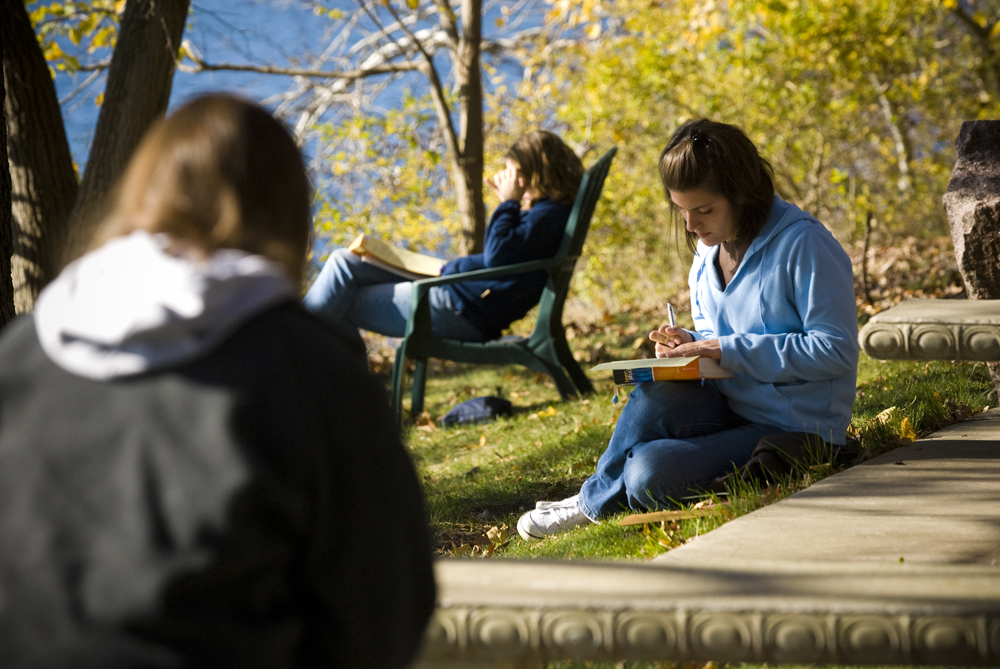
Homecomings for Christ-following secular university students may not always be perfectly sweet. The mellow look of sympathy from a friend or loved one is accompanied by the statement that “Now that you’re home, you can be with real Christian people.” Or the concerned question “How in the world can you study under professors that don’t believe in Jesus?” might be followed by “Do you have friends who drink?”
As Christians, we are an extremely diverse group of people. We are not marked out by our skin color or our physical appearance, our anthropological form or our particular language. Rather, we are marked out by the state of our souls. Our group contains all skin colors, dialects, and tribes. We are His people and He has called each of us to a specific calling that is unique to us. My specific calling for my time on earth is different than every other Christian’s calling, and the same can be said of you. Generally, we do a pretty good job of respecting this fact. We respect that a pastor is called to serve the church directly and to teach, while a computer technician is called to glorify God in his workplace and through advancing technology, and an artist is called to glorify God through her art.
However, I’ve encountered that many Christians are afraid of the calling to secular academics. I’m sure this is a common experience for many Emerging Scholars. This is what my mentors and I now call the Myth of Sodom. Essentially, when I hear “Now you get to be with real Christian people” after returning from a semester at a public college, I hear “Welcome back. Hope you survived Sodom and Gomorrah”. I’ve seen this prevalent in Christians who are in their teens to Christians who can’t remember the details of their teen years. And I’ve been guilty of it myself, and have needed to repent of it and ask the Lord to change me.
Essentially, sometimes Christians mentally label the secular university in its entirety as a modern day Sodom and Gomorrah (See Genesis 18 and Genesis 19 if you need a refresher!). Around the time the Lord made clear to me that He was calling me not just to attend a secular university, but to minister to its needs as my vocation, I got all sorts of worried looks, as did my parents. As a philosophy major, I watched as Christian brothers and sisters in Christ worried about my safety as if I was headed to a strange and hostile country. Some had serious talks with my parents asking them to re-consider letting me go. Others will still tell me I made the wrong decision to this very day (long after I’ve “survived” a good deal of time at a secular school).
But I don’t believe that the Lord sees my university as a Sodom. And I don’t believe there is cause for worry. There is always cause for prayer (and I welcome the opportunity to ask for prayer!), but there is truly nothing to be afraid of. As some ESN scholars are called to serve the Lord in secular academics, we need to be able to communicate and clarify the reality of the public university to our brothers and sisters in Christ who are frankly terrified of it. Most importantly, we need to be able to clearly communicate the mission that Christ has for the public university and our role in it.
Here are some vital things I’ve learned to communicate to others while dealing with this myth:
- There is some reason to pray, but never to worry. If Christ calls a student to a secular university, He will provide. How many people drink on campus or how few/little professors are Christians is irrelevant to this fact. If the student pursues Christ, Christ will prepare the way and He will walk with them. Usually, it’s been helpful for me to follow up with a concrete story of a Christian sister who has impacted my life during my time at school. On my campus, there is rampant atheism, sin, debauchery, fornication, alcoholism, disrespect towards parents, hatred of authority, and most of all abandonment from Christ. My school has been ranked among the best “party” schools in the nation. I will happily acknowledge and speak of all of this to fellow members of the body of Christ. But if the student pursues Christ, He will provide. Prayer is vital towards fending against the schemes of the enemy who wants to trap young Christian college students. I don’t want to seem like I am diminishing the dangers of the public university campus. But most of all, I don’t want to diminish the majesty and power of Christ who reigns.
- You can learn things from a secular professor. If you want to go completely philosophical, you can explain in detail Augustine’s theory of the illumination of knowledge, but essentially, I usually point out that most people attend public high school, and those who don’t at least take Driver’s Education from a non-Christian. Did we learn anything in Driver’s Ed from Mr. Smith, even if he hated Christians? Yes, absolutely! He taught us to parallel park! So, too, we can learn things from secular professors.
- If secular Philosophy is so dangerous that it is to be feared, then we need to re-think how we view the Gospel. I can sense the fear for me that some of my well-meaning friends communicate when they ask how bad it is to study under atheistic professors. My parents can tell you stories of friends who came up to them and wanted to know how they expected me to survive studying philosophy from people who didn’t know Christ. The assumption behind all of this is that secular Philosophy is a dangerous and powerful tool that can overcome the truth of the Gospel[1]. And this, my friends, is a lie. Secular philosophy is not stronger than the Gospel, because the Gospel is truth and secular philosophy is a lot of lies with a teaspoon of truth. That is all it is. Secular philosophy has a conniving and crafty enemy of our souls behind it, but we have the Ruler of the Universe behind the Gospel. Who will win in the end? Jesus. And He Himself is Truth. His Truth is stronger than lies, and if we are meditating on it and seeking Him, we can experience that victory.
-

The blessing of campus fellowship. God can bless you richly in a desert. I’ve written on ESN before (see link here) about the desert that has been my academic career and the way the Lord has poured water within it. However, I’ve also experienced the way that God blesses us through rich Christian community at the secular university. Water is most satisfying to us when we are in a drought, just as sweet community in Christ is most satisfying to us when it isn’t abundant in our area. I’ve found my time in fellowship with other believers to be sweet and more sharpening than I did before I went to public university. Students who pursue Christ at public university are being led to swim upstream, and thus their faith quickly becomes stronger because of the endurance it takes to be constantly swimming upstream from the group.
Hopefully, these paths of communication are somewhat helpful to you as you (or your friends) deal with the Myth of Sodom. What has dealing with this myth looked like in your life? How do you respond to it?
[1] When I use this method of communication, I’m somewhat using the “worldview” sense of the term philosophy. However, it is imperative for us to fully comprehend the wealth of philosophers who have used their discipline to glorify the Lord. Christ is glorified by philosophy which honors Him! From philosophers of the ages like Augustine to the philosophers of today like Dallas Willard and Alvin Plantinga, the history of philosophy is filled with the legends of people who used their study of philosophy to magnify their Creator.
Monica Greenwood (pseudonym) waited impatiently for three years for the day she walked into her first graduate seminar in philosophy. Before that momentous day, she was an undergrad upperclassman studying philosophy at a state school known for its agriculture program. Today, she writes, studies, teaches, and her passion remains the same: the education of undergraduates, specifically underclassmen, in introductory philosophy courses.

I was recently at a church where, during the sermon, the pastor — a man I very much respect and admire, and whom I studied under while attending a Christian undergraduate institution — expressed his immense concern about Yale’s “Sex Week” and how it represented the deep perversion of the secular university, saying that it would lead to the acceptance of bestiality and pedophilia. So this post strikes home in a slightly different way; the concern wasn’t over drinking or secular philosophy, it was quite literally over the sins of Sodom and Gomorrah. I think most of your responses still hold true, though.
Thanks, Monica, for your post. I believe there is also something to be said for being salt and light in all places, including the secular university. When I was searching for an academic job, I found the secular university, in its diversity, to be welcoming; whereas the Christian university wanted me to sign statements about my faith and promised behavior. The statements were not problematic in themselves, except that they seemed to me to be legalistic rather than reliant on grace. I still feel called to the big research one university (and Christian universities’ sad lack of research competitiveness is a whole other topic), where my faith is both accepted and challenged.
“If secular Philosophy is so dangerous that it is to be feared, then we need to re-think how we view the Gospel.”
Precisely. I have no interest in believing in something which cannot stand up to scrutiny or challenge. If the truth in Christian teaching, theology, philosophy, etc., is not robust enough to hold up in the presence of secular philosophy or other worldviews, then I question whether it is really truth at all. Fortunately, I have not found that to be the case, and in fact feel that my faith has been strengthened by submitting it to rigorous cross-examination.
Nice post. I have mixed feelings. Perhaps it’s more like “Ninevah.” Certainly godless, and surely dangerous for the lone ranger Christian who is not going to find a local body of Christ. But the beauty of Jonah is that one of the greatest revivals in history broke out in that city that Jonah hated.
The Sodom & Gomorrah myth has too much of a isolationist flavor to it…fortress theology. Raise the drawbridge! Don’t let the heathen get into our cozy Christian fellowship!
I guess there is a balance between acknowledging the real dangers of the University (many students do abandon fellowship and turn away from the faith) against the imperative to go OUT into the world–like the University.
My advice would be to go for it, fear not. We’re sent like sheep among wolves. BUT don’t go alone-stay in fellowship.